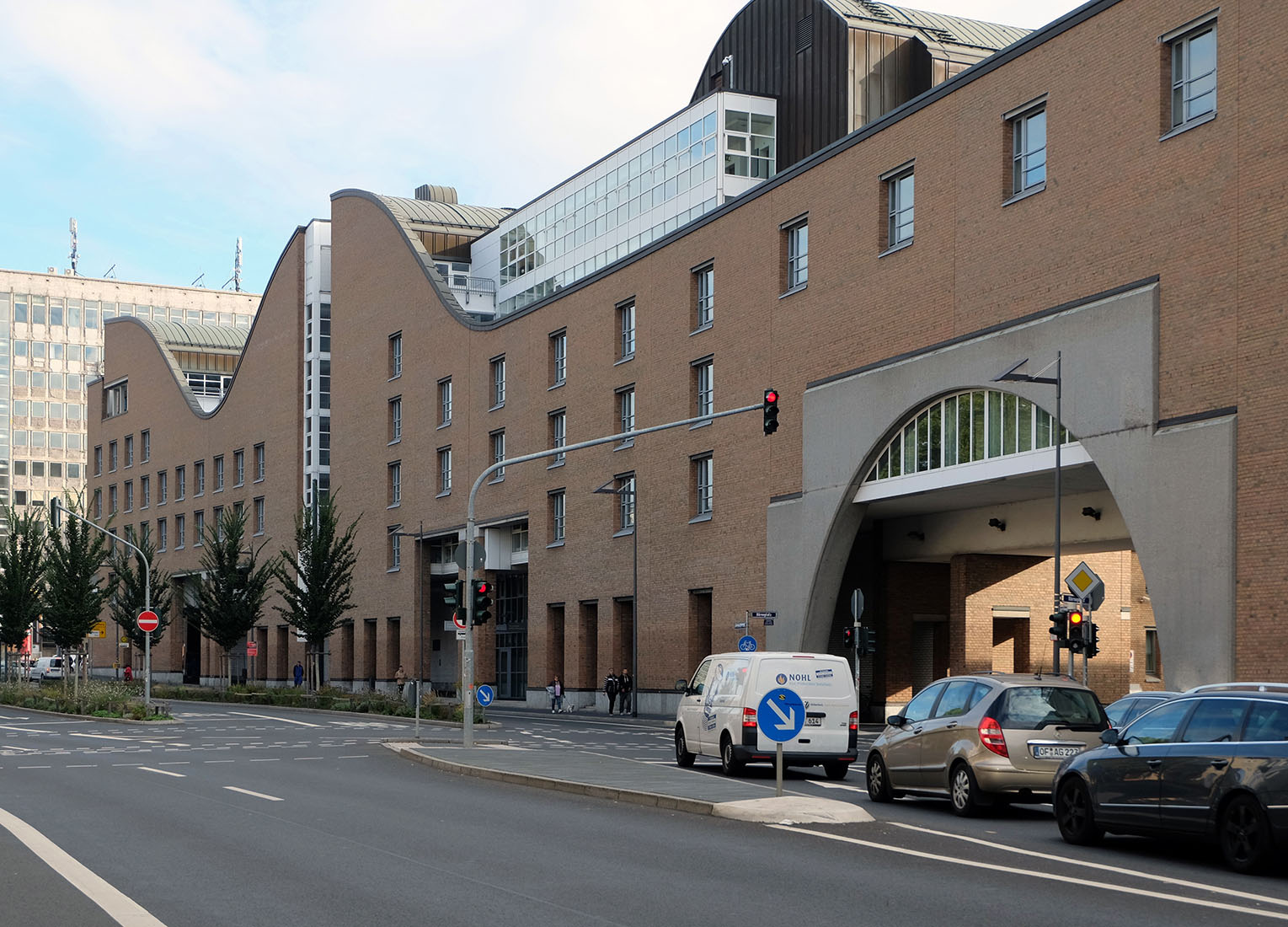 |
 |
 |
 |


Customer Centre of the Public Services Frankfurt am Main
Kurt-Schumacher-Strasse 10, Frankfurt
1985 - 1990
The
most discussed new building in Frankfurt in the early 1990s was not a
recently built museum or a newly arisen skyscraper in the Frankfurt
skyline,
but the new customer center of the pubilc services at Börneplatz. Ernst Gisel received the opportunity to build this complex thanks to a competition success
in the year 1985. Topic of the debate was not so much the architecture, but rather the extremely controversial construction site. The building lot is located between
the Dominican monastery, rebuilt in 1958/59, and the old Jewish cemetery. This location was a part of the former Judengasse (jewish lane) until her demolition
in the years after 1864. This had been the ghetto of the former second-largest Jewish community in Germany. When the excavation work started in 1987,
there were found the foundations of 14 houses of the former jewish lane. The last of these houses had been demolished exactly one hundred years before.
The magistrate defied the vehement demand for a building freeze. In the end there was reached a compromise which was approved also by the jewish community.
This agreement stipulated that the removed and then reconstructed foundations of five houses and a ritual bath built in 1462, were to be integrated in the
new building together with a museum. This museum should document the history of the ghetto and the Jewish community of Frankfurt. Ernst Gisel's original design idea
was not impaired: Two wall slabs of yellow brick oscillating in different degrees, determine the overall form of the building. Between them were placed two transverse
office wings which are two-side oriented. Together with a three-side oriented middle wing, they form two large halations, which are covered with an inwardly sloping
glass roof structure. The museum section with the reconstructed foundations penetrates into the north atrium hall, which is used as a customers hall. The museum
therefore can be viewed from this customer hall. This results in a second office level within the atrium, stimulating the interior space. In the second atrium, the
so-called Casino, one encounters the establishment restaurant.
The western wall along the Kurt-Schumacher-Strasse recalls the mediavel stepped surrounding wall of Frankfurt, taking into account its orientation and structure.
It comprises a passage and the entrance areas at the ground floor, while in the upper floors there are the horizontal and vertical connections of the office wings
as well as meeting rooms of different sizes. On the main elevation at the Kurt-Schumacher-Strasse the office wings are just slighly visible.
They are visible only in so far as as they tower above the undulating facade border. The eastern wall, containing the secondary circulation spaces of the offices,
shields the views from the customer service center to the cemetery, which had been destroyed by the Nazis as well as the Börneplatz synagogue. To the north,
bordering a heavy traffic road (Battonnstrasse), the offices are protected by a glazed passage which is arranged in front of them. This glazed gallery establishes
also the important link between the Museum Judengasse and the old Jewish cemetery.
but the new customer center of the pubilc services at Börneplatz. Ernst Gisel received the opportunity to build this complex thanks to a competition success
in the year 1985. Topic of the debate was not so much the architecture, but rather the extremely controversial construction site. The building lot is located between
the Dominican monastery, rebuilt in 1958/59, and the old Jewish cemetery. This location was a part of the former Judengasse (jewish lane) until her demolition
in the years after 1864. This had been the ghetto of the former second-largest Jewish community in Germany. When the excavation work started in 1987,
there were found the foundations of 14 houses of the former jewish lane. The last of these houses had been demolished exactly one hundred years before.
The magistrate defied the vehement demand for a building freeze. In the end there was reached a compromise which was approved also by the jewish community.
This agreement stipulated that the removed and then reconstructed foundations of five houses and a ritual bath built in 1462, were to be integrated in the
new building together with a museum. This museum should document the history of the ghetto and the Jewish community of Frankfurt. Ernst Gisel's original design idea
was not impaired: Two wall slabs of yellow brick oscillating in different degrees, determine the overall form of the building. Between them were placed two transverse
office wings which are two-side oriented. Together with a three-side oriented middle wing, they form two large halations, which are covered with an inwardly sloping
glass roof structure. The museum section with the reconstructed foundations penetrates into the north atrium hall, which is used as a customers hall. The museum
therefore can be viewed from this customer hall. This results in a second office level within the atrium, stimulating the interior space. In the second atrium, the
so-called Casino, one encounters the establishment restaurant.
The western wall along the Kurt-Schumacher-Strasse recalls the mediavel stepped surrounding wall of Frankfurt, taking into account its orientation and structure.
It comprises a passage and the entrance areas at the ground floor, while in the upper floors there are the horizontal and vertical connections of the office wings
as well as meeting rooms of different sizes. On the main elevation at the Kurt-Schumacher-Strasse the office wings are just slighly visible.
They are visible only in so far as as they tower above the undulating facade border. The eastern wall, containing the secondary circulation spaces of the offices,
shields the views from the customer service center to the cemetery, which had been destroyed by the Nazis as well as the Börneplatz synagogue. To the north,
bordering a heavy traffic road (Battonnstrasse), the offices are protected by a glazed passage which is arranged in front of them. This glazed gallery establishes
also the important link between the Museum Judengasse and the old Jewish cemetery.